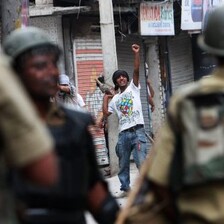The Electronic Intifada 18 November 2015

Protesters confront Indian forces in Srinagar, Kashmir, in August 2014.
EPAKashmir remains one of the world’s most intensely militarized zones.
India has resorted to mass repression and gross human rights violations like torture, systematic sexual violence, enforced disappearances and killings, and continues to wage a multi-faceted war on Kashmir.
A legacy of the British colonial rule, the conflict in Kashmir was born out of the bloody history of partition leading to the formation of the nominally secular but Hindu-majority Republic of India and the Islamic Republic of Pakistan in 1947. Under British India, Jammu and Kashmir was a Muslim-majority princely state under the oppressive regime of a Hindu ruler.
At the time of the partition, princely states were encouraged to accede to either India or Pakistan, depending on factors like geographical contiguity.
The ruler of Kashmir delayed his decision. In October-November 1947, hundreds of thousands were killed or forced from their homes. Soon after, armed fighters from Pakistan attacked the region.
The king sought military help from India in exchange for a controversial conditional accession to India. After the first major war between India and Pakistan, the United Nations brokered a ceasefire and called for a referendum for Kashmir’s future, which was never carried out. A mass armed rebellion against India broke out in 1989, preceded by rigged elections in the region.
The people of Kashmir have continued to resist for more than six decades now.
PalestineKashmir
My heart quivers like a wounded sparrow,
as I utter your three-syllabic name
under my native breath
In cold winter nights,
when my sanctuary was invaded,
your cities, burning, ascended to heavens
Your lush olives and dreams when torn asunder,
our apple orchards and maples—captive,
howled too
Beyond fortified towers of meaning,
an unintelligible stutter of longing
made borders porous,
Palestine, Kashmir
KashmirPalestine
PalesKashTineMir—
monozygotic twins of our
mother freedom,
rocking us in history’s cradle
As a four-year-old,
I learnt to sing you like a rhyme
in unison with my country’s name
My mother treasured your olives
a keepsake of the Blessed Land—
a relic I never touched.
How does one count yearning?
Decades, epochs,
eons?
What traverses when an hour passes,
or a minute-hand moves?
Metrology is laughable
but memory isn’t:
like of a child’s shoe, her only trace
found under the rubble of her bombed home
Weaving dreams on her spinning wheel,
my grandmother invoked you in her songs,
I memorized the rhyme
I call out to you— fa les teen!
my lips tremble,
in my heart hope settles
as ash of gutted seasons,
falling like snow
on our similar topographies of pain
in Gaza and GawKadal
Haifa and Handwor
Sair and Sopore
In a dream our dead children console me:
a nation is beyond a country
a country beyond nation
Sorrowfully smearing
ripe olives on their faces, they whisper:
Will you look for us if we don’t return?
Thousand rainbows
tremble on my eyelids
as I read their letters from heaven
Disentangling my hair fragrant
with irises from
your garden,
my fingers paint us
on maps of belonging.
Fragrances trespass.
A native of Kashmir, Uzma Falak blogs for Oxford-based New Internationalist and her poetry has been featured in publications including Palestine Chronicle, Kafila, Kindle Magazine, and Cultural Anthropology


